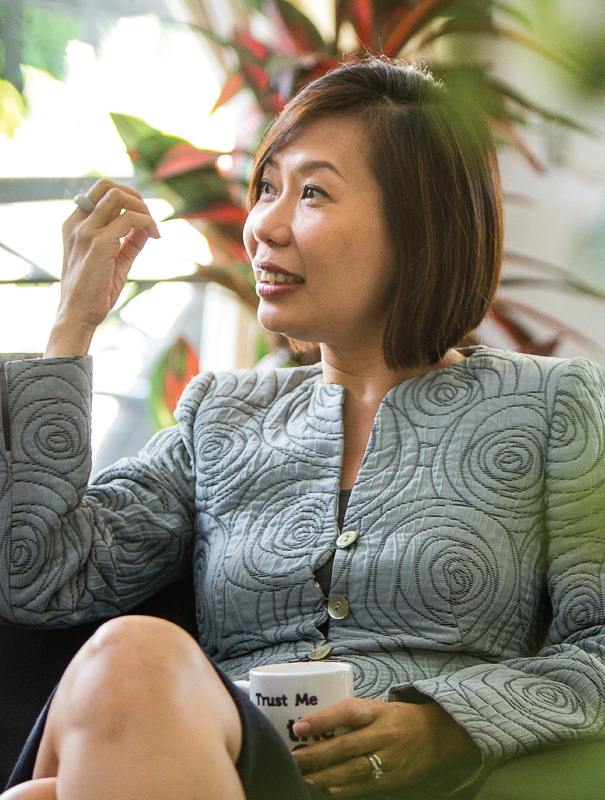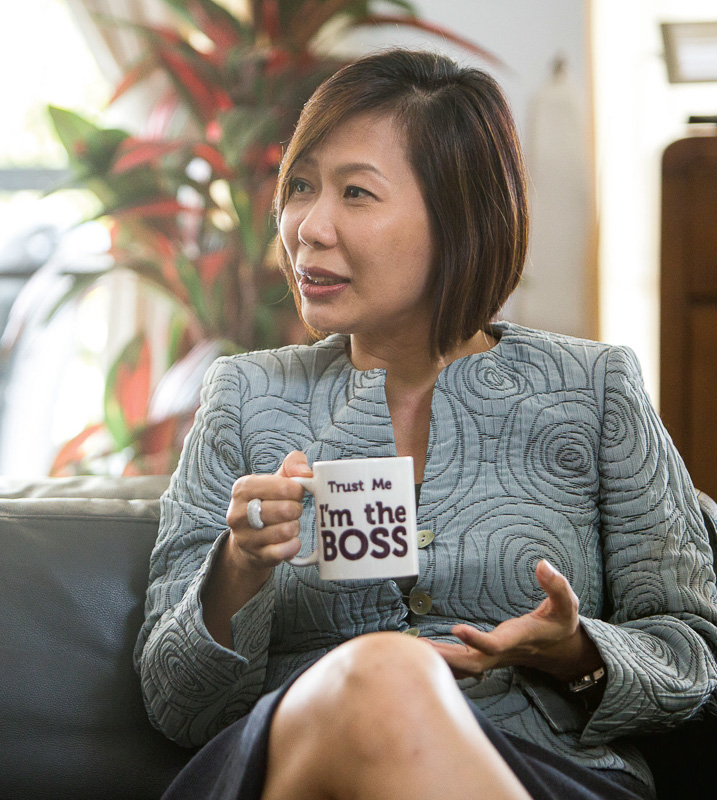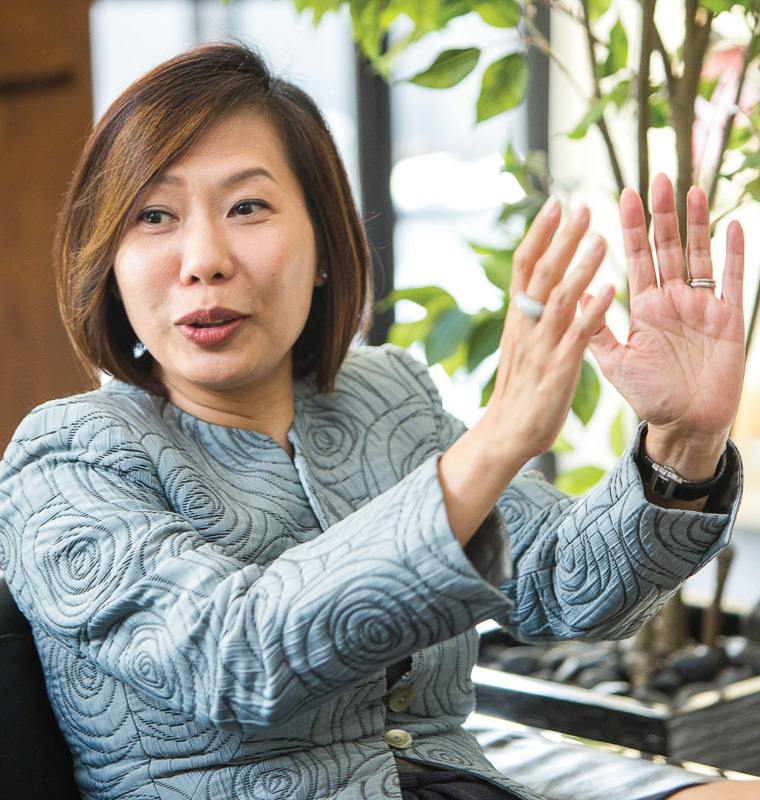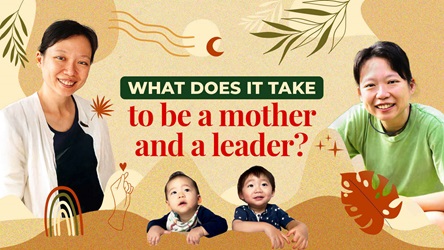“I Learnt Not To Take Things At Face Value”, Ow Foong Pheng

As the cliché goes, sometimes all it takes is a good teacher to give you a lesson for life.
Mrs Ow Foong Pheng, Permanent Secretary of the Ministry of Trade and Industry (MTI), knows this too well. For a lesson from her Hwa Chong Junior College years still sticks in her mind: how her geography teacher turned round one day and challenged her class to explain why a particular theory, which he had spent the whole day before teaching as absolutely correct, could be flawed.
“It taught me to question and be more discerning. [I learnt] not to take things at face value,” she recalls. It is an attitude Mrs Ow has retained throughout her life, as she rose through the ranks after joining the Administrative Service in 1986, in positions at the Ministries of Education, National Development, Finance and Defence.
That would explain why she was unfazed by the recent news that Singapore had slipped one place to rank fifth in the IMD World Competitiveness Yearbook this year.
More important to analyse
“Do companies really look at that ranking to make an investment decision?” she asks, in what turns out to be a candid discussion at Masons, a bistro at Gillman Barracks.
“I would say not,” she continues. “I’m not so obsessed with [being in] first or second position. It’s more important to analyse the reasons behind why we have slipped.” (And she might be on the money: two months after this interview, the Republic kept its spot as the world’s second most competitive economy in the World Economic Forum’s Global Competitiveness Report.)
Still, her current biggest source of stress is that rising business costs would erode Singapore’s economic competitiveness. She explains that the biggest challenge facing MTI is Singapore’s current economic restructuring. As the country moves towards productivity-driven growth, there is a need to ensure that in the transition, “we don’t end up with huge sectors suddenly hollowing out of Singapore.”
In the same upfront manner, Mrs Ow admits she too has had moments of self-doubt when she became JTC Corporation’s Chief Executive Officer in 2006, after being Deputy Secretary at the Ministries of Manpower and Home Affairs. She may hold an honours degree in politics, philosophy and economics from the University of Oxford, and a masters in management from Stanford University, but she has no training in engineering.
“[But] I told myself, just ask common sense questions and recognise that I’m a generalist... I don’t need to do engineering drawings – and I should not! Let the specialists do their jobs.”

The straight talker
A self-confessed introvert, Mrs Ow reveals that her time at JTC also taught her the importance of public relations. At the time, JTC had had to build up its cachet as an attractive employer to draw talent, so she had to engage with the media more actively than she was used to.
Though she had to go out of her comfort zone, “as the leader of an organisation, there was a need to be the face of it. So I just had to smile and do it.”

Still, Mrs Ow is no shrinking violet – she asks hard questions and is blunt with her feedback in order to get work done. Her forthrightness comes through too when she recalls female staff asking her questions about work-life balance, something which “invariably comes up for women bosses”, she notes, adding, “I don’t know why they don’t ask the male bosses!”
She does have this to say though: “Work and life are balanced not every day, but across your life. At different life stages, you need to decide on your priority.” Mrs Ow, who is in her 40s, spends most of her free time with her son, 15, and daughter, 19. She tries to have dinner with them every night, something she has not managed to achieve “100 per cent of the time”. But keeping this aim in mind, she is selective in her evening engagements and tries to get home in time for dinner.
She also makes sure she gets enough time on her own to recharge, including exercising six times a week, whether on her cross trainer machine at home, at Pilates sessions or climbing Bukit Timah Hill on weekends with her husband. In May, she scaled Mount Kinabalu with 19 of her staff, who were surprised by her participation because they had always thought she was “quite soft”.
Meanwhile we tell her we’ve heard that she has exacting standards at work. She replies: “No less than what my bosses have required of me! I’ve been held to those standards, so I think that everyone should.”

Challenging times
When asked about her career highs and lows, Mrs Ow pauses, then recalls 2003’s Severe Acute Respiratory Syndrome (SARS) outbreak, when she was Secretary to both the Executive Group and the Ministerial Committee on SARS.
“For three months, we were working non-stop, yet the crisis seemed to be deepening. More people were dying,” she says. “I felt a bit depressed and wondered if we were doing the right thing; yet we needed to go on. That was a very low point.
“The high point was when we were declared SARS-free and we knew that all our efforts had paid off.” From her extensive experience in leading various agencies, Mrs Ow advises younger public officers “to ask questions now, not when they are older and more senior [in position], because we do cut youngsters some slack.
“If you don’t articulate your views, I would not know what’s going on up there [in the mind]. And it will make it very hard to teach and mentor.”

What is usually in your cuppa?
Coffee, with milk, and no sugar.
How often do you take it?I have a cup of Nespresso in the office every morning when I get to work, and another after lunch. I avoid caffeine after 4pm.
- POSTED ON
Nov 21, 2013
- TEXT BY
Denyse Yeo
- PHOTOS BY
John Heng
-
Big Idea
Why Facts Don't Change Minds









